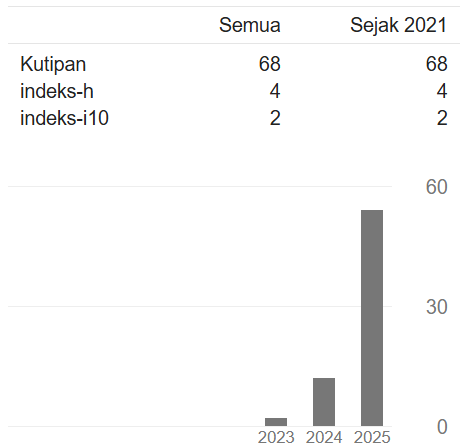Going Concern Audit Opinion: Does it Depend on Disclosure and Previous Years’ Audit Opinion?
Abstrak
A going Concern Audit Opinion is an opinion given by an independent auditor to the auditee. This opinion contains the auditor's assessment regarding the company's sustainability. This opinion is one factor that becomes a consideration for management, creditors, investors, and other stakeholders in making decisions. The population in this study were all companies listed on the Indonesia Stock Exchange for the 2017 - 2019 period. The sample selection technique used purposive sampling, and 25 companies were obtained, so 50 samples were processed. Hypothesis testing uses multivariate analysis, namely logistic regression, with E-Views 10 software. This research aims to determine the effect of disclosure and the previous year's opinion on going concern audit opinion with opinion shopping as a moderating variable. This research found that disclosure did not affect the acceptance of going-concern audit opinions. Still, the previous year's opinion positively affected the acceptance of going-concern audit opinions. These results indicate that investors have to be careful in reading the audit opinion of the previous year regarding the company's going concern.
##plugins.generic.usageStats.downloads##
Referensi
Adzroo, N. U., & Suryaningrum, D. H. (2023). Pengaruh Leverage, Likuiditas, Profitabilitas, Sales Growth, Good Corporate Governance dan Corporate Social Responsibility terhadap Financial Distress pada Perusahaan Manufaktur yang terdaftar di Bursa Efek Indonesia Periode 2015-2019. Jurnal Ilmiah Wahana Akuntansi, 18(1), 128–150. https://doi.org/10.21009/10.21009/wahana.18.018
Ardillah, K. (2023). Do Environmental Performance, Feminism in Commissioner, Female Audit Committee, and Corporate Visibility Affect Corporate Environmental Disclosure? JASF: Journal of Accounting and Strategic Finance, 5(2), 193–214. https://doi.org/10.33005/jasf.v5i2.232
Averio, T. (2021), The analysis of influencing factors on the going concern audit opinion – a study in manufacturing firms in Indonesia, Asian Journal of Accounting Research, Vol. 6 No. 2, pp. 152-164. https://doi.org/10.1108/AJAR-09-2020-0078
Azzahra, A. S. & Wibowo, N. (2019), Pengaruh Firm Size dan Leverage Ratio Terhadap Kinerja Keuangan pada Perusahaan Pertambangan, JWEM: Jurnal Wira Ekonomi Mikroskil, 9(1), 13-20. https://doi.org/10.55601/jwem.v9i1.588
Dana, L. -P., Salamzadeh, A., Mortazavi, S., & Hadizadeh, M. (2022). Investigating the Impact of International Markets and New Digital Technologies on Business Innovation in Emerging Markets. Sustainability, 14(2), 983. https://doi.org/10.3390/su14020983
Downar, B., Ernstberger, J., & Reichelstein, S. et al. (2021), The impact of carbon disclosure mandates on emissions and financial operating performance. Rev Account Stud 26, 1137–1175. https://doi.org/10.1007/s11142-021-09611-x
Fidiana, F., Yani, P., & Suryaningrum, D. H. (2023), Corporate going-concern report in early pandemic situation: Evidence from Indonesia, Heliyon, 9 (4), e15138. https://doi.org/10.1016/j.heliyon.2023.e15138
Freeman, R. E. & McVea, J. (2001), A Stakeholder Approach to Strategic Management (2001). Available at SSRN: https://ssrn.com/abstract=263511 or http://dx.doi.org/10.2139/ssrn.263511
Geiger, M. A., & Raghunandan, K. (2002). Going-concern opinions in the “New” legal environment. Accounting Horizons, 16(1), 17–26. https://doi.org/10.2308/acch.2002.16.1.17
Ghozali, I. (2016), Desain Penelitian Kuantitatif dan Kualitatif untuk Akuntansi, Bisnis dan Ilmu Sosial Lainnya, Publisher: Yoga Pratama
Goh, B. W. (2012), Auditor reporting under Section 404: The association between the internal control and going concern audit opinions. (2012). Contemporary Accounting Research. 30, (3), 970-995. https://doi.org/10.1111/j.1911-3846.2012.01180.x
Habib, A. (2013), A meta‐analysis of the determinants of modified audit opinion decisions, Managerial Auditing Journal, Vol. 28 No. 3, pp. 184-216. https://doi.org/10.1108/02686901311304349
Herawaty, V., & Nugraha, M. A. (2023). Antecedents of Audit Report Lag with Audit Quality as a Moderator. JASF: Journal of Accounting and Strategic Finance, 6(2), 320–342. https://doi.org/10.33005/jasf.v6i2.477
IAPI, (2011). Standar Profesional Akuntan Publik. Jakarta: Salemba Empat. https://alengwee.wordpress.com/wp-content/uploads/2011/10/sa-seksi-341.pdf
Lennox, C. (2000). Do companies successfully engage in opinion-shopping? Evidence from the UK, Journal of Accounting and Economics, Volume 29, Issue 3, 321-337, https://doi.org/10.1016/S0165-4101(00)00025-2.
Lennox, C. (2002). Going-concern Opinions in Failing Companies: Auditor Dependence and Opinion Shopping. http://papers.ssrn.com/sol3/papers.cfm.
Lev, B. (2018). The deteriorating usefulness of financial report information and how to reverse it. Accounting and Business Research, 48(5), 465–493. https://doi.org/10.1080/00014788.2018.1470138
Lindawati, A. S. L., & Puspita, M. E. (2015). Corporate Social Responsibility: Implikasi Stakeholder dan Legitimacy Gap dalam Peningkatan Kinerja Perusahaan. Jurnal Akuntansi Multiparadigma, 157–174. https://doi.org/10.18202/jamal.2015.04.6013
Liwaul, L., Dali, N., & Sahrun, S. (2023). Evaluating Financial Health and Sustainability of Post-Merger Port Operations in Indonesia: Liquidity and Profitability Insights. JASF: Journal of Accounting and Strategic Finance, 6(2), 236–258. https://doi.org/10.33005/jasf.v6i2.466
Minutti-Meza, M. (2021). The art of conversation: the expanded audit report. Accounting and Business Research, 51(5), 548–581. https://doi.org/10.1080/00014788.2021.1932264
Octaviani, M., & Harymawan, I. (2022). Corporate Secretary Professional Expertise and Annual Report Readability. JASF: Journal of Accounting and Strategic Finance, 5(2), 233–251. https://doi.org/10.33005/jasf.v5i2.250
Perera, D. & Chand, P. (2015). Issues in the adoption of international financial reporting standards (IFRS) for small and medium-sized enterprises (SMES), Advances in Accounting,Volume 31, Issue 1, 165-178, https://doi.org/10.1016/j.adiac.2015.03.012.
Praptitorini, M. D., & Januarti, I. (2011). Analisis Pengaruh Kualitas Audit, Debt Default dan Opinion Shopping terhadap Penerimaan Opini Going Concern. Jurnal Akuntansi dan Keuangan Indonesia, 8(1), 78–93. https://doi.org/10.21002/jaki.2011.05
Ramadhan, A. P. & Sumardjo, M. (2021). Previous Years Audit Opinions, Profitability, Audit Tenure and Quality Control System on Going Concern Audit Opinion. European Journal of Business and Management Research, 6(2), 140–145. https://doi.org/10.24018/ejbmr.2021.6.2.817
Siahaan, I. F. M., & Suryaningrum, D. H. (2024). Investigation Audit Procedures in Revealing Fraud at PT XYZ by KAP JAS. Small Business Accounting Management and Entrepreneurship Review, 4(2), 24-34. https://doi.org/10.61656/sbamer.v4i2.223
Susanto, Y. K. (2018). Faktor-Faktor Yang Mempengaruhi Penerimaan Opini Audit Going Concern Pada Perusahaan Publik Sektor Manufaktur. Jurnal Bisnis dan Akuntansi, 11(3), 156–174. https://doi.org/10.34208/jba.v11i3.242
Tihar, A., Sari, I. P., & Handoko, B. L. (2021). Effect of Debt Default, Disclosure, and Financial Distress on the Receiving of Going Concern Audit Opinions. Journal The Winners, 22(2), 155-161. https://doi.org/10.21512/tw.v22i2.7072
Tsang, A., Frost, T., & Cao, H. (2023), Environmental, Social, and Governance (ESG) disclosure: A literature review, The British Accounting Review, Volume 55, Issue 1, 101149. https://doi.org/10.1016/j.bar.2022.101149.
Wardani, R. P. (2011). Faktor-Faktor yang Mempengaruhi Luas Pengungkapan Sukarela. Jurnal Akuntansi dan Keuangan, 14(1). https://doi.org/10.9744/jak.14.1.1-15
Wulandari, S. (2014). Analisis Faktor-Faktor yang Mempengaruhi Auditor dalam Memberikan Opini Audit Going Concern. E-Jurnal Akuntansi, 6(3), 531–558. https://ojs.unud.ac.id/index.php/akuntansi/article/view/8350
##submission.copyrightStatement##
##submission.license.cc.by4.footer##












